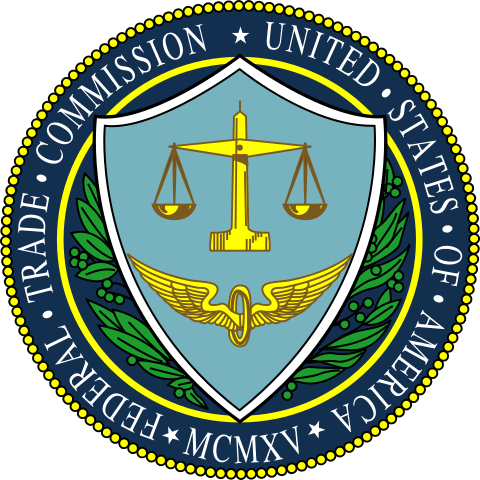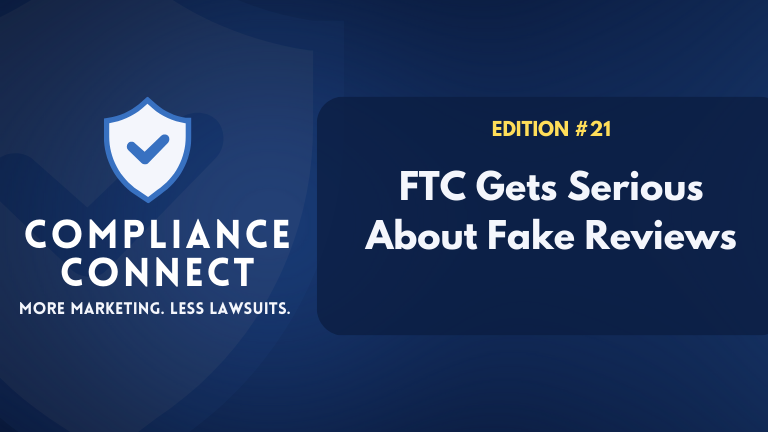Good morning! This is the twenty-first edition of the Compliance Connect newsletter.
The goal is simple: to keep you in the loop on what the FTC and other regulatory agencies are up to so that you can protect yourself.
These newsletters will land in your inbox twice a week – Mondays and Thursdays.
Remember: this is NOT legal advice, only information!
Here’s the rundown today…
- 💬 FTC Cracks Down On Fake Reviews
- 🤝 Tax Prep Giant Settles With The FTC
- 🔨 How Contractors Can Get You In A Lawsuit
- 🕰️ One Of The First FTC Cases
- 3️⃣ The 3 Main Responsibilities Of The FTC
Compliance Digest: What You Should Read Today
The FTC Orders Sitejabber To Stop Faking Product Reviews
The FTC has accused Sitejabber, a review platform, of tricking people by pretending that its ratings and reviews came from customers who had actually used the products or services.
The FTC says Sitejabber collected reviews right after customers made a purchase, before they even received or used the items. This made average ratings and review counts higher than they really were.
Sitejabber also gave businesses tools to show these early reviews on their own websites, making it seem like real customer feedback.
Under the new agreement, Sitejabber must stop making or helping with any fake claims about reviews.
An interesting note about this case is that it was a 5-0 ruling by the FTC, meaning both the Republican and Democratic commissioners agreed with the action.
It also coincides with the FTC’s new rules on fake reviews and testimonials.
H&R Block Settles With The FTC
The FTC and H&R Block appear to have a reached a settlement on the case we discussed in edition 15.
H&R Block was accused of promoting its tax filing products as “free,” but many consumers were not eligible for the free service, as it was limited to “simple returns.”
The settlement requires H&R Block to…
- Allow users to downgrade to cheaper products WITHOUT needing to contact customer service or losing previously entered data.
- Pay $7 million to redress consumers harmed by its practices.
- Disclose eligibility limitations in “free” advertising and make changes to improve transparency for the 2025 tax season.
Here’s a link to the proposed settlement.

Can Contractors Open You Up To A Lawsuit?
Many business owners improperly use contractors in their business.
Contractors are appealing – you typically don’t have to pay as much in taxes, and there are fewer regulations.
However, if you improperly use them, you can get into A LOT of trouble.
The FTC recently settled a $7 million case with a gig economy company, Arise Virtual Solutions, that classified workers as contractors.
The Department of Labor also stepped in, arguing that these workers should have been treated as employees, with all the associated taxes and benefits.
Contractor or Employee?
If you’re using contractors in your business, there’s one critical question you need to ask: Are these contractors truly independent, or are they so integrated into your business that they could be seen as employees?
If a contractor is earning most of their income from your business and lacks independent clients, they MAY be classified as an employee, meaning you’re responsible for payroll taxes, benefits, and possibly back pay.
How To Avoid Misclassification
#1 – Encourage Independent Business Operations: Ensure contractors have their own business set up, preferably with other clients. This strengthens their independence from your company.
#2 – Use Clear Contracts: Draft solid contractor agreements, specifying that they are responsible for their equipment and risk. To avoid potential legal issues, have contractors sign both as their business entity AND personally.
#3 – Be Cautious with Control: Requiring contractors to use company-owned equipment or controlling their hours closely can blur the lines between an employee and a contractor.
#4 – Consider Using International Contractors: Hiring contractors outside the U.S. may reduce risk, as international contractors are less likely to trigger domestic employment laws.
When in doubt, consult an attorney who specializes in employment law to ensure your contractor relationships are structured correctly.
A misclassification case can be devastating, leading to hefty fines and liability from multiple agencies.
For more details, check out this episode of the Don’t Say That podcast.
Did You Know…
One of the first cases brought by the FTC against a company for deceptive marketing was when it sued the Royal Baking Powder Company.
The FTC claimed that they hid the fact that it changed the recipe for its popular baking powder. They were also accused of falsely claiming that the price of their baking powder was half off, even though the price was the same. The case was decided in 1922.

Quick Compliance Tip: The 3 Main Responsibilities Of The FTC
We talk a lot about the FTC, especially when it comes to compliant marketing.
However, the FTC’s responsibilities go further than that. Here’s a brief overview of the key responsibilities of the FTC.
1. Advertising Laws
Section 5 of the FTC Act is a deceptive trade practices provision.
Basically, it sets forth the FTC’s core purpose of ensuring advertisements are truthful and don’t contain express misrepresentations or create an improper “net impression.”
This is the basis for most of the FTC cases that we talk about in this newsletter.
2. Privacy & Data Protection
With the advancement of the internet and the collection of credit card numbers, privacy and data protection are atop the list of FTC concerns.
This led to the largest settlement in FTC history when, in 2019, the FTC fined Facebook $5 billion for privacy violations.
Companies not only have names and contact information, but all kinds of data, including family connections, product preferences, places people visit, and so on.
3. Overseeing Mergers & Acquisitions
The FTC has targeted monopolies for over 100 years. This is pretty much WHY the FTC was founded.
The problem with monopolies is that when one company controls the product category on the market, they control the supply chain, the pricing, and everything else about the product, making the consumer completely beholden to them.
One of the roles of the FTC is to look out for customers’ interests.
History is full of examples of the FTC stopping mergers that it believes will harm consumers.
A recent example is the merger between Staples and Office Depot. As long as the two companies remain separate, the customer has a choice. But if they merge, then customers would only have the illusion of choice, which is a big problem
Under the leadership of Lina Khan, this has been a major focus of the agency. This has proven to be controversial.
